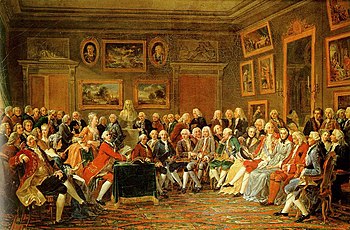
The Enlightenment was an intellectual movement that lasted from approximately 1715 to 1789, characterised by its emphasis on reason[4]scientific method and individual freedom. Philosophers such as Voltaire, Rousseau, Kant and Locke challenged religious orthodoxy and traditional authority, promoting empiricism and rational thought. Key developments included challenging monarchical power, introducing concepts of natural rights and advancing scientific understanding. O rationalism[1] Cartesian and Lockian empiricism provided philosophical foundations, with thinkers distinguishing between moderate (accommodative) and radical (democratic) approaches. The movement significantly impacted theory politics[2]and introduced ideas about social contracts, religious tolerance and the separation of church and state. State[5]. Important publications such as the Encyclopaedia disseminated Enlightenment ideas, subsequently influencing political revolutions and intellectual movements in Europe and America, and laying the foundations for modern principles of democracy[3] liberal.
Enlightenment (also called Enlightenment, Century of Reason, Illustration e Clarification) was the intellectual and philosophical movement that took place in the Europe in the 17th and 18th centuries. He presented a series of social ideas centred on the value of knowledge learnt through rationalism and the empiricism and political ideals such as the natural law, a freedom and progress, a tolerance, a brotherhood, o constitutional government and formal separation of church and state.

The Enlightenment preceded and overlapped with the Scientific Revolution and the work of Johannes Kepler, Galileo Galilei, Francis Bacon, Pierre Gassendi e Isaac Newtonamong others, as well as the rationalist philosophy of Descartes, Hobbes, Spinoza, Leibniz e John Locke. Some date the beginning of the Enlightenment to the publication of the Discourse on Method, from René Descartesin 1637, with his method of systematically disbelieving everything unless there was a well-founded reason to accept it, and introducing his famous saying, Cogito, ergo sum ("I think, therefore I am"). Others cite the publication of Principia Mathematica of Isaac Newton (1687) as the culmination of the Scientific Revolution and the beginning of the Enlightenment. European historians traditionally date its beginning to the death of Louis XIV of France in 1715 and its end with the outbreak of the French Revolution in 1789. Many historians now date the end of the Enlightenment as the beginning of the 19th century, the last proposed year being the death of Immanuel Kant in 1804. In reality, historical periods don't have clearly defined start or end dates.
Philosophers and scientists of the period widely publicised their ideas through meetings in scientific academies, masonic lodges, literary salons, cafés and in printed booksperiodicals and flyers. The ideas of the Enlightenment undermined the authorities monarchies and religious movements and paved the way for the political revolutions of the 18th and 19th centuries. A variety of 19th century movements, including the liberalism, o socialism and neoclassicismHis intellectual heritage goes back to the Enlightenment.
The central doctrines of the Enlightenment were the individual freedom and religious toleranceas opposed to absolute monarchy and the power of religious authorities. The Enlightenment was marked by a growing awareness of the relationship between the mind and the everyday media of the world and by an emphasis on the scientific method and the reductionismalong with a growing questioning of religious orthodoxy - an attitude captured by Kant's essay Answering the question: What is the Enlightenment?, where the phrase sapere aude ('dare to know') can be found.